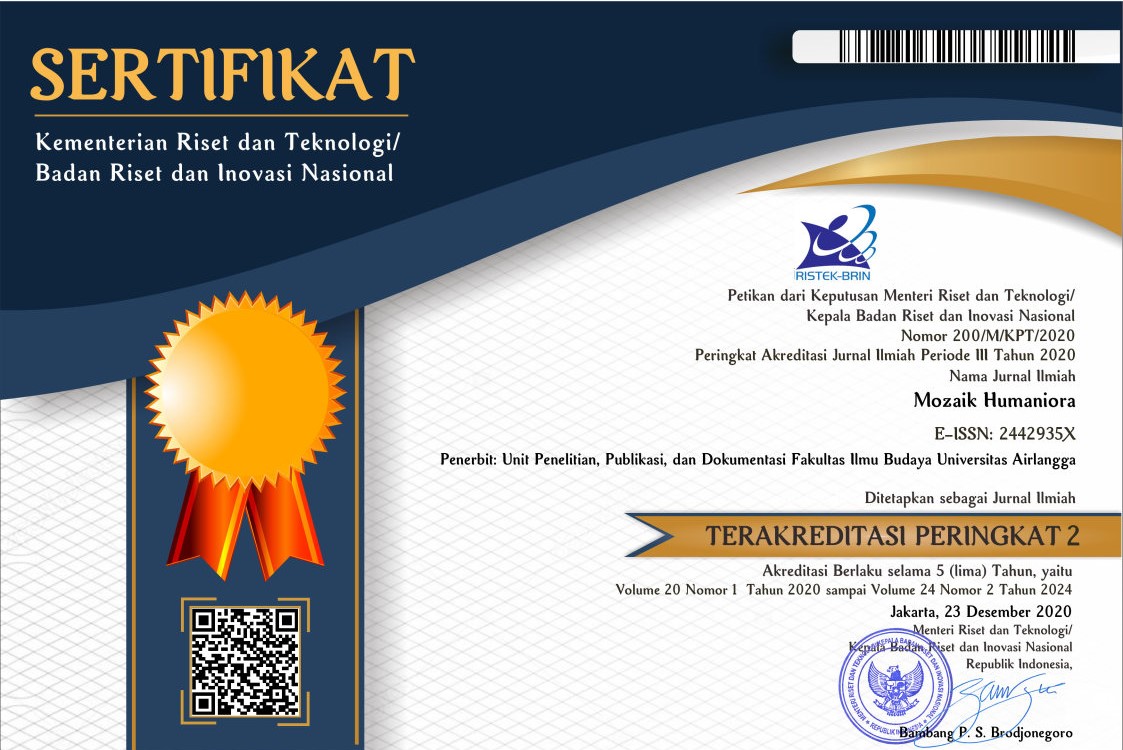Literacy Learning Model Based on Surabaya's Local Identities in Community-Based Libraries of Surabaya
Downloads
This study investigates the ways bottom-up learning, specifically discovery and project-based learning, in strengthening local wisdom and identities among the youths in Surabaya. The local identities of Surabaya are generally associated with being egalitarian, urban, and multicultural. Despite the strong association of Surabaya with the bravery of Surabaya youths in the 1945 war against the Allied troops (semangat arek Suroboyo), young people of Surabaya nowadays do not internalize the spirit strongly. Our preliminary observation suggests the fact, and this can be seen from their writings before joining the writing class that we conducted. In coordination with the Public Library of Surabaya (Municipal Library and Archive of Surabaya) and community-based libraries in Surabaya, this experimental research was conducted to gain insights on the extent to which discovery and project-based learning can stimulate junior high school students to be more aware of their locally rooted identities. The study shows that the application of the student-centered learning methods can contribute significantly to the internalization and representation of Surabaya identities reflected in the students' writings.
Abdillah, A. 2007. "Budaya Arek Suroboyo.” Tesis. Surabaya: Universitas Airlangga.
A'yuni, Q. Q. 2015. "Literasi Digital Remaja di Kota Surabaya: Studi Deskriptif tentang Tingkat Kompetensi Literasi Digital pada Remaja SMP, SMA dan Mahasiswa di Kota Surabaya.” Skripsi. Surabaya: Universitas Airlangga.
Bender, W. N. 2012. Project-Based Learning, Differentiating Instruction for 21st Century. United States of America: Sage.
Cribb, R. 2008. "The Brief Genocide of Eurasians in Indonesia, 1945/46.” In Empire, Colony, Genocide: Conquest, Occupation, and Subaltern Resistance in World History, edited by A. Dirk Moses. New York: Berghahn Books.
Frederick, W. H. 2012. "The Killing of Dutch and Eurasians in Indonesia's national revolution (1945–49): a ‘Brief Genocide' Reconsidered.” Journal of Genocide Research 14 (3-4): 359”380. DOI: https://doi.org/10.1080/14623528.2012.719370.
Kern, R. 2000. Literacy and Language Teaching. Oxford: Oxford University Press.
Nguyá»…n, T. M. T. and Nguyá»…n, T. M. L. 2017. "Influence of Explicit Higher-Order Thinking Skills Instruction on Students' Learning of Linguistics.” Thinking Skills and Creativity 26: 113”127. DOI: https://doi.org/10.1016/j.tsc.2017.10.004.
Rafi, R. 2013. "Analisis Aktivitas Pemberdayaan Masyarakat dalam Mengingkatkan Minat Baca pada Komunitas Insan Baca.” Skripsi. Surabaya: Universitas Airlangga
Sharma, P. L. 2005. Discovery Teaching and Learning, Sarup Teaching Learning Series-4. New Delhi: Sarup and Sons.
Sholihatin, E. 2013. "Are Swear Words Always Perceived Negatively?: The Function of Swearing in Arek Society and Mataraman Society.” Mozaik 13 (2): 158-167. DOI: http://dx.doi.org/10.20473/mozaik.v13i2.3843.
Silas, J., R. Hastijanti., P. Basundoro, Sumarno, Handinoto, and F. A. Demettawati. 2018. Pasak Sejarah Indonesia Kekinian Surabaya 10 Nopember 1945. Surabaya: Bagian Hubungan Masyarakat Pemerintah Kota Surabaya.
Street, B. V. 2013. Social Literacies: Critical Approaches to Literacy in Development, Ethnography and Education. New York, Routledge.
Sungkowati, Y. 2019. "Arek Culture in Literary Works.” International Seminar on Languages, Literature, Art and Education 1 (1): 163”168. DOI: https://doi.org/10.21009/ISLLAE.01126.
Sutarto, A. 2004. "Studi Pemetaan Kebudayaan Jawa Timur: Studi Deskriptif Pembagian 10 (Sepuluh) Sub Kebudayaan Jawa Timur.” Jember: Program Studi Antropologi FISIP Universitas Jember.
Williamson, J. 2008. Literacy in the Student-Centered Classroom, A Practical Approach to Setup, Design, and Implementation. London: Rowman & Littlefield Education.
Wulan, N. 2016. "Taman Bacaan Berbasis Komunitas: Model Perpustakaan Mandiri sebagai Salah Satu Bentuk Pemberdayaan Masyarakat Marjinal di Kotamadya Surabaya.” Laporan Penelitian. Surabaya: Universitas Airlangga.
Copyright (c) 2022 Nur Wulan, Kukuh Yudha Karnanta, Ni Luh Ayu Sukmawati, Puji Karyanto

This work is licensed under a Creative Commons Attribution-ShareAlike 4.0 International License.

Mozaik Humaniora is licensed under a Creative Commons Attribution-ShareAlike 4.0 International License. Both authors and Mozaik Humaniora agree with the following attribution of journal:
1. Copyright of this journal is possession of Author, by the knowledge of the Editorial Board and Journal Manager, while the moral right of the publication belongs to the author.
2. The journal allows the author(s) to retain publishing rights without restrictions
3. The legal formal aspect of journal publication accessibility refers to Creative Commons Attribution Share-Alike (CC BY-SA).
4. The Creative Commons Attribution Share-Alike (CC BY-SA) license allows re-distribution and re-use of a licensed work on the conditions that the creator is appropriately credited and that any derivative work is made available under "the same, similar or a compatible license”. Other than the conditions mentioned above, the editorial board is not responsible for copyright violation.


















